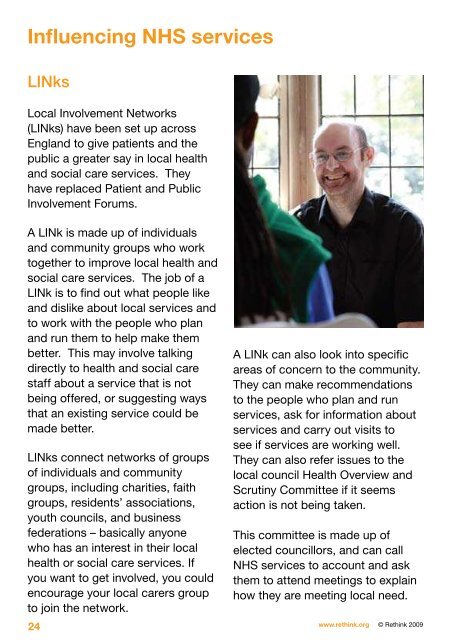You Care, You Count: A carers' guide to getting support - Rethink
You Care, You Count: A carers' guide to getting support - Rethink
You Care, You Count: A carers' guide to getting support - Rethink
Create successful ePaper yourself
Turn your PDF publications into a flip-book with our unique Google optimized e-Paper software.
Influencing NHS services<br />
LINks<br />
Local Involvement Networks<br />
(LINks) have been set up across<br />
England <strong>to</strong> give patients and the<br />
public a greater say in local health<br />
and social care services. They<br />
have replaced Patient and Public<br />
Involvement Forums.<br />
A LINk is made up of individuals<br />
and community groups who work<br />
<strong>to</strong>gether <strong>to</strong> improve local health and<br />
social care services. The job of a<br />
LINk is <strong>to</strong> find out what people like<br />
and dislike about local services and<br />
<strong>to</strong> work with the people who plan<br />
and run them <strong>to</strong> help make them<br />
better. This may involve talking<br />
directly <strong>to</strong> health and social care<br />
staff about a service that is not<br />
being offered, or suggesting ways<br />
that an existing service could be<br />
made better.<br />
LINks connect networks of groups<br />
of individuals and community<br />
groups, including charities, faith<br />
groups, residents’ associations,<br />
youth councils, and business<br />
federations – basically anyone<br />
who has an interest in their local<br />
health or social care services. If<br />
you want <strong>to</strong> get involved, you could<br />
encourage your local carers group<br />
<strong>to</strong> join the network.<br />
A LINk can also look in<strong>to</strong> specific<br />
areas of concern <strong>to</strong> the community.<br />
They can make recommendations<br />
<strong>to</strong> the people who plan and run<br />
services, ask for information about<br />
services and carry out visits <strong>to</strong><br />
see if services are working well.<br />
They can also refer issues <strong>to</strong> the<br />
local council Health Overview and<br />
Scrutiny Committee if it seems<br />
action is not being taken.<br />
This committee is made up of<br />
elected councillors, and can call<br />
NHS services <strong>to</strong> account and ask<br />
them <strong>to</strong> attend meetings <strong>to</strong> explain<br />
how they are meeting local need.<br />
Boards of Direc<strong>to</strong>rs<br />
of Trusts<br />
Direc<strong>to</strong>rs are appointed <strong>to</strong> Trust<br />
Boards <strong>to</strong> govern the work of the<br />
Trust. They can be ‘lobbied’ on<br />
issues important <strong>to</strong> local people<br />
through letter writing campaigns<br />
or individual meetings with Board<br />
members.<br />
If you are concerned about services<br />
provided by the primary care trust,<br />
you can ask for the Local Delivery<br />
Plan, which sets out targets and<br />
priorities for the next three years.<br />
<strong>You</strong> can refer <strong>to</strong> items in this plan<br />
when making your argument, which<br />
will help get Direc<strong>to</strong>rs interested in<br />
what you have <strong>to</strong> say.<br />
Strategic Health<br />
Authorities<br />
<strong>You</strong> can also refer <strong>to</strong> the wider<br />
regional priorities set out by your<br />
Strategic Health Authority (there are<br />
eight in England). These authorities<br />
are ultimately responsible for<br />
primary care tusts and set out the<br />
areas they should be addressing,<br />
including priorities for mental<br />
health. If you ask the Strategic<br />
Health Authority for a copy of this<br />
plan, you can also use this <strong>to</strong> argue<br />
for better services.<br />
Mental Health<br />
Commissioners<br />
It is also worth finding out who the<br />
Commissioning Manager for mental<br />
health is at your primary care trust.<br />
They are the person responsible<br />
for securing mental health services<br />
for the people served by that<br />
Trust. They may not have a strong<br />
understanding of how effective<br />
some types of service can be.<br />
<strong>You</strong> could try <strong>getting</strong> lots of people<br />
<strong>to</strong> write <strong>to</strong> them or invite them <strong>to</strong> a<br />
mental health carers’ group <strong>to</strong> find<br />
out more. It is useful <strong>to</strong> show them<br />
any evidence for how effective a<br />
type of service or therapy can be,<br />
as they need <strong>to</strong> be confident that it<br />
is worth spending money on it.<br />
<strong>You</strong> could show them which<br />
treatments and services are<br />
recommended by the National<br />
Institute for Health and Clinical<br />
Excellence for different mental<br />
health conditions, as this is based<br />
on strong evidence.<br />
Go <strong>to</strong> www.nice.org.uk/guidance<br />
<strong>to</strong> read the <strong>guide</strong>lines. New<br />
<strong>guide</strong>lines for schizophrenia will<br />
come out in early 2009. <strong>You</strong> can<br />
read short summaries of the<br />
<strong>guide</strong>lines, you don’t have <strong>to</strong> read<br />
all the pages.<br />
www.rethink.org © <strong>Rethink</strong> 2009 © <strong>Rethink</strong> 2009 www.rethink.org<br />
24 25



